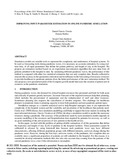Mostrar el registro sencillo del ítem
Improving input parameter estimation in online pandemic simulation
| dc.creator | García de Vicuña Bilbao, Daniel | es_ES |
| dc.creator | Mallor Giménez, Fermín | es_ES |
| dc.date.accessioned | 2022-10-24T11:37:30Z | |
| dc.date.available | 2023-02-23T00:00:16Z | |
| dc.date.issued | 2021 | |
| dc.identifier.citation | Garcia-Vicuna, D., & Mallor, F. (2021). Improving input parameter estimation in online pandemic simulation. 2021 Winter Simulation Conference (WSC), 1-12. https://doi.org/10.1109/WSC52266.2021.9715311 | en |
| dc.identifier.isbn | 978-1-6654-3311-2 | |
| dc.identifier.uri | https://hdl.handle.net/2454/44250 | |
| dc.description.abstract | Simulation models are suitable tools to represent the complexity and randomness of hospital systems. To be used as forecasting tools during pandemic waves, it is necessary an accurate estimation, by using real-time data, of all input parameters that define the patient pathway and length of stay in the hospital. We propose an estimation method based on an expectation-maximization algorithm that uses data from all patients admitted to the hospital to date. By simulating different pandemic waves, the performance of this method is compared with other two statistical estimators that use only complete data. Results collected to measure the accuracy in the parameters estimation and its influence in the forecasting of necessary resources to provide healthcare to pandemic patients show the better performance of the new estimation method. We also propose a new parameterization of the Gompertz growth model that eases the creation of patient arrival scenarios in the pandemic simulation. © 2021 IEEE. | en |
| dc.description.sponsorship | This paper was supported by the COVID grant of Navarre's Government 0011-3597-2020-000003 and the grant PID2020-114031RB-I00 (AEI, FEDER EU). | en |
| dc.format.mimetype | application/pdf | en |
| dc.language.iso | eng | en |
| dc.publisher | IEEE | en |
| dc.relation.ispartof | 2021 Winter Simulation Conference (WSC), 2021, pp. 1-12 | en |
| dc.rights | © 2021 IEEE. Personal use of this material is permitted. Permission from IEEE must be obtained for all other uses, in any current or future media, including reprinting/republishing this material for advertising or promotional purposes, creating new collective works, for resale or redistribution to servers or lists, or reuse of any copyrighted component of this work in other work. | en |
| dc.subject | Data handling | en |
| dc.subject | Expectation-maximisation algorithm | en |
| dc.subject | Health care | en |
| dc.subject | Hospitals | en |
| dc.subject | Internet | en |
| dc.subject | Parameter estimation | en |
| dc.title | Improving input parameter estimation in online pandemic simulation | en |
| dc.type | Contribución a congreso / Biltzarrerako ekarpena | es |
| dc.type | info:eu-repo/semantics/conferenceObject | en |
| dc.date.updated | 2022-10-24T11:37:30Z | |
| dc.contributor.department | Institute of Smart Cities - ISC | es_ES |
| dc.contributor.department | Estadística, Informática y Matemáticas | es_ES |
| dc.contributor.department | Estatistika, Informatika eta Matematika | eu |
| dc.rights.accessRights | info:eu-repo/semantics/openAccess | en |
| dc.rights.accessRights | Acceso Embargado | es_ES |
| dc.embargo.terms | 2023-02-23 | |
| dc.identifier.doi | 10.1109/WSC52266.2021.9715311 | |
| dc.relation.projectID | info:eu-repo/grantAgreement/AEI/Plan Estatal de Investigación Científica y Técnica y de Innovación 2017-2020/PID2020-114031RB-I00/ES/ | en |
| dc.relation.publisherversion | https://doi.org/10.1109/WSC52266.2021.9715311 | |
| dc.type.version | Versión publicada / Argitaratu den bertsioa | es |
| dc.type.version | info:eu-repo/semantics/publishedVersion | en |


